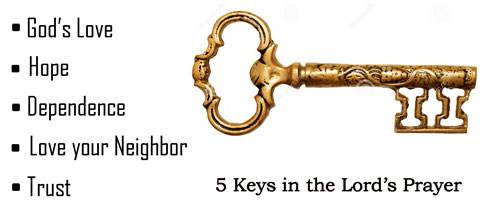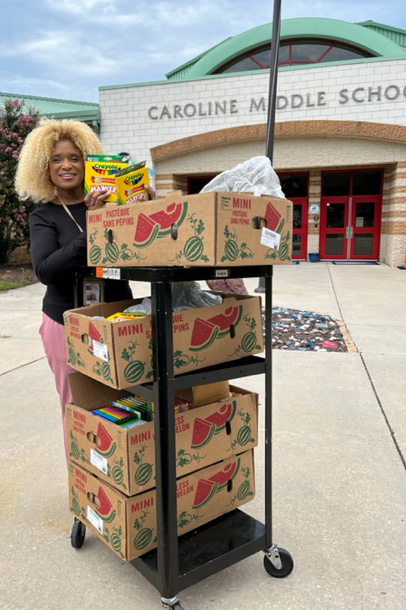I. Theme – Relating to God with Boldness and Persistence

“Enriched Bread” – Corita Kent
The lectionary readings are here or individually:
First Reading – Genesis 18:20-32
Psalm – Psalm 138
Epistle – Colossians 2:6-15, (16-19)
Gospel – Luke 11:1-13
Today’s readings encourage us to relate to God with boldness and persistence. The gospel today, Luke 11:1-13, is a collection of Jesus’ sayings about prayer. So the first reading is the story of Abraham’s intercession with God on behalf of some innocent potential victims who live in Sodom. The psalmist gives thanks for God’s strong hand in a time of trouble. Paul warns the Colossians not to exchange the lordship of Christ for human teachings. Jesus teaches his disciples how to pray and illustrates the right attitudes with a story. The readings also present the many faces of God – as challenger, restorer, enemy, parent, and transformer.
The scriptures of the Judeo-Christian faith fully reveal the true character of God. The passage from Genesis is one of the most sublime revelations of the nature of God in the Bible. The extraordinary dialogue between Abraham and God teaches us two vital lessons: first, that God hears the prayers of those whose hearts are in tune with God’s; secondly, that God’s readiness to pardon is an integral factor in God’s justice.
Abraham’s boldness in challenging God came from his firm conviction that the lord could not act contrary to perfect justice by destroying the righteous indiscriminately with the wicked. “Shall not the judge of all earth do right?” This certain and lofty conception of the character of God still has not been fully grasped. For centuries, human societies have continued to truncate and pervert the biblical concept of divine justice, and very often human justice is untempered by mercy.
Abraham’s controversy with God also revealed the noble character of this patriarch whose name means “friend of God.” Abraham went to God in prayer with a conflict in his heart. His own sense of justice—“will you sweep away the righteous with the wicked?”—stood against his belief that the wicked must pay the penalty for their wickedness. Here, in Abraham, we see the intimations of God’s own dilemma with human creatures. In Christ we see the solution God provided.
God’s justice and righteousness were brought to bear upon sinful humanity through Jesus. Through Jesus, sinners are granted fullness of life with God as if they were perfectly righteous. The bond of wickedness was cancelled and set aside, nailed to the cross.
Punishment is our understanding of the consequences of our own actions when they don’t work out for us. It feels like God has abandoned us. Rather, God has not abandoned us, but the false god that said if we were good enough good things would happen. Instead, Jesus tells us that God sends rain to the righteous and the unrighteous. But what happens to those who are faithful is that we experience God’s restoration as justice—God brings down the high and raises up the low, as in the Magnificat.
In the gospel passage, Jesus intends to make only one point in his story about the midnight caller. If we, who are not good, know how to respond to a reasonable or good request, how much more will God fulfill requests that are borne to God in earnest prayer.
Many great devotional teachers have offered guidance in the art of prayer. One thing they all seem to agree on is that we should not give up praying for something until we either receive it or it is made clear that it is not God’s will to grant it. “Praying through” requires more patience than most of us can maintain. We blur our petitions in haste, flitting from this to that, dissipating our energy and concentration. How can we expect God to deal with a list of supplications that lightly changes from day to day?
When we call, God will answer, but we must sincerely ask, seek and knock, until heaven opens in one way or another.
II. Summary
First Reading – Genesis 18:20-32
Sodeom, along with its sister community, Gomorrah, really serves as a fulcrum that stands between the texts regarding the Visitation at Mamre, and the Bargaining over Sodom, and its eventual Destruction. This truncated selection of verses raises the question of why God wanted to destroy Sodom in the first place.
The Lord God and two angels have, in disguise, visited Abraham, who welcomed them from last week’s visit (Genesis 18:1-10a). As Abraham gradually discovers their identities, they start a trip to nearby Sodom, and the ever hospitable Abraham accompanies them.
Genesis 18:20-32 is the story of Abraham bargaining with God over the fate of Sodom and Gomorrah. Our second thread in the Hebrew Scriptures this season shares with us the promises of God, how God is faithful to the covenant
The destruction of Sodom and Gomorrah was a common example among the prophets for human wickedness that brings God’s just judgment. The specific kind of evil was variously indicated. The people of Sodom and Gomorrah have turned from God and worship other gods, primarily with male temple prostitutes. Isaiah identified it with social and judicial vices (Isaiah 1:9-10, 3:9). Jeremiah associated it with the prophets’ betrayal of their vocation (Jeremiah 23:14). Ezekiel connected it with pride and neglect of the poor and needy (Ezekiel 16:46-56).
The “outcry” against the sins of these towns prompts the lord to investigate. God is about to destroy the city completely, near where Abraham’s nephew Lot lives .Because of Abraham’s covenant relationship, he is allowed to know God’s secret thoughts. He begins to bargarin. Suppose there are 50 righteous people—won’t you save the cities for the 50 righteous? God replies that no, God will not. Then Abraham continues to bargain down until, if he can find ten, God will not destroy the cities.
Unfamiliar with the ways of the lord, Abraham intercedes for the innocent who will suffer the same fate as the guilty sinners. Abraham ends with a communal “ten,” and does not mention his family (Lot’s family) as innocents. Abraham returns to his home – a nomad’s tent, and we leave Lot in the midst of a teeming and complicated urban environment. But even though God is willing to bargain, apparently there were not even ten just persons to be found
We know that they are destroyed in the next chapter, but we see that even among Abraham, the idea of total and utter destruction is abhorrent. This is not God’s ways. It happens at times, but this is not what God desires. God’s covenant is about restoration and hope, and as one reads the Bible, the utter destruction of an entire community is never the ultimate plan, but rather, restoration is. But it will take some time for the people to turn from their ways, and for their understanding of God’s justice to change
Abraham ends with a communal “ten,” and does not mention his family (Lot’s family) as innocents. Abraham returns to his home – a nomad’s tent, and we leave Lot in the midst of a teeming and complicated urban environment.
Psalm – Psalm 138
Psalm 138, a song of thanksgiving, praises God for God’s faithfulness, for God’s care not only for the powerful, but the powerless. God’s love endures forever, and God will not forget
This psalm of thanksgiving has many parallels with the later parts of Isaiah, and was probably written sometime after the return from exile. The “gods” of verse 1 may be the members of the heavenly council or the rulers and gods of other nations. Verses 1-4 give praise for the lord’s help, and verses 5-7 describe the effect of God’s majesty and mercy upon the kings of the earth. The psalm concludes with an expression of the psalmist’s trust that God will personally care for him. Although all creation is under God’s care, the lord’s intimate love is available to each individual.
In this thanksgiving psalm, we see God receiving the praise and thanksgiving of the psalmist despite the presence of the other gods. The following verses recite the reasons for such faithfulness on the part of the psalmist. The most profound of these recitations (especially in light of the first reading, and Abraham’s advocacy) is “When I called, you answered me.” That is the strength and the relationship that the psalmist’s faith is based on. There is an attempted universality in the psalm that sits on a spectrum that ranges from the individual thanksgivings of the psalmist to the “All the kings of the earth” who have heard the words of God. There is a similar dimensionality in the following verse in which God “on high” still cares for the lowly, an arc of comfort and of justice.
Epistle- Colossians 2:6-15, (16-19)
The Christians at Colossae were exposed to a variety of philosophical and theological teachings, many of which were incompatible with the gospel. Two weeks ago, in the first of this series of readings from Colossians, we saw that Paul had to establish that Christ was superior to any other possible mediator between humanity and God. Then in last Sunday’s selection, we saw that Christ in us is our hope of glory.
Colossians 2:6-19 is a warning against falling into the common strain of thoughts in that day—the Greek philosophy that embedded the cultural teachings, and the Greek mythology of the universe.
Paul warns them against “philosophy.” In Paul’s time the word meant, not rational inquiry, but occult speculations and practices. Such teachings were concerned with propitiating “the elemental spirits of the universe,” probably here referring to angels or to the stars and planets conceived of as living beings having influence over our world. In their hierarchically ordered picture of the universe, the “fullness of deity” was thought to emanate from the highest god and be distributed among the heavenly powers.
What Paul is arguing against is the ritual excess of not just Judaism as well as those of the mystery religions, he also warns against those Christians who have adopted strict practices in contravention to the Gospel of Jesus. He alludes to some of the requirements in an argument which he begins with “you were circumcised with a spiritual circumcision” and then placing Christ at the center of the concept. In the manner of Paul, the author positions to elements in distinction from the one another – the fleshly circumcision, and that of the spirit. “The substance belongs to Christ”, he declares, acknowledging that Christ is the head of the Body.
Paul reminds the Colossians that they have “received”—a technical term for the handing on of normative tradition (1 Corinthians 11:23, 15:1, 3)—”Chr ist Jesus the lord.” Thus they are to “live in him” as the only foundation for their faith. The writer reminds the listener that our faith is rooted in Christ, not in human ways of thinking. Paul claims that this “fullness” is Christ’s alone, for he is above all these powers.
Today the question is, “How, then, do we get Christ in us?” Paul’s answer is that when we were buried in the waters of baptism, we were united with Jesus in his saving death, and when we emerged from the saturating waters, we were joined to Christ in his resurrection. (Paul assumes that the ritual of baptism obviously simulates burial and resurrection.)
God’s activity changes everything. With Romans 8, Colossians affirms that nothing can separate us from the love of God. In baptism, we share in death and experience new life in Christ. We are truly transformed in the baptismal waters, becoming a truly new creation, liberated from the past and everything that threatens to overwhelm us. Those who were “dead” because of their sins, God has forgiven by canceling the record of indebtedness (a common Judaic figure for sin).
Gospel – Luke 11:1-13
Luke 11:1-13 contains Luke’s version of the Lord’s Prayer and also what it means to persevere. Luke’s forms are spare and simple, perhaps reflecting an earlier form than that in Matthew, which is offered at the Sermon on the Mount (Matthew 6:9-15).
This lesson on prayer was urged upon Jesus by his disciples who apparently had experienced the disciples of John the Baptist at prayer. In this episode, Jesus discusses three aspects of prayer: the discipline and form of prayer, the need for persistence, and the effectiveness of prayer
This lesson is also offered in the context of Jesus own life of prayer. Indeed, Luke depicts Jesus at prayer often: baptism, choosing of the Twelve, Peter’s confession, the Transfiguration, at the Last Supper, on the Mt. of Olives, and at the Crucifixion. Jesus is the model for a parent whose love is relational, inspiring, supportive, and nurturing. God does not compete with humankind in terms of power, but wants us to claim our power as God’s beloved children.
In this simple Lukan form, the prayer reflects the expectations of the relationship of a benevolent patron (a father of a household, king or master) to his dependents. Luke affirms the loving parenthood of God. God is the best of parents and – in contrast to the vision of God portrayed in Hosea – gives us grace and support long before we ask.
The opening address identifies God as our heavenly father. The first set of petitions indicate how we, as God’s dependents, will fulfill our part of the relationship by respecting the holiness of God’s name (or person) and make our own God’s aim of creating the kingdom community here on earth.
The second set of petitions asks God to fulfill the divine obligations in the relationship by providing food (“our daily bread”), forgiving our offenses (conditioned, of course, on our forgiveness of others), and protecting us from evil.
We are called to persevere in our prayers, asking God for what we need, and that God’s gifts are good. Sometimes our prayers are not answered the way we want them to be, but Jesus reminds us in this prayer that we are to ask for what we need, and that we need forgiveness.
Jesus then illustrates both the nature of our petitions and the response of God in a parable. The parable is a “can you imagine” situation, focusing on the readiness of the friend to help. In the context in which Luke places it, attention is shifted to the “persistence” of the needy friend. On the principle of what applies to smaller things ought to apply even more to greater things, the parable encourages us to believe that the Father’s answer to our prayerful petitions will always be more ready and certain than that of humans.
Thus, in order to receive forgiveness, we must also forgive. In the same way, we must persevere in helping to meet the needs of others, so that our needs may also be met. Our prayers gain power from our motivation and orientation: when we turn to God, we become godlike in our care for others. We forgive as we have been forgiven and live in the spirit of God’s realm. Resonating with the divine vision, we can boldly ask, seek, and knock, and are inspired not only to expect miracles but accept miracles at the hand of a generous God. God gives us the Holy Spirit and with the presence of the Spirit, we receive everything we need to flourish and to serve God.











